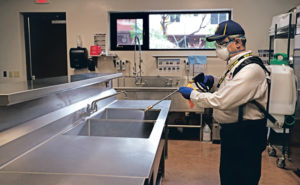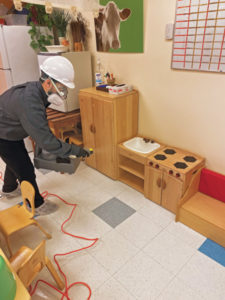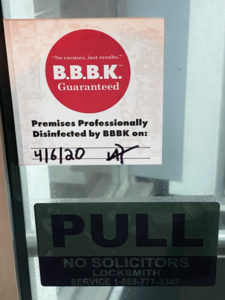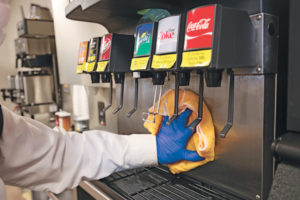
A Truly Nolen technician sanitizes a restaurant sink. PHOTO: GRANT HUNKER/TRULY NOLEN PEST CONTROL
The coronavirus pandemic created an opportunity for many pest management professionals (PMPs) to offer a new add-on service: sanitizing and disinfecting.
Because PMPs have experience cleaning up after cockroach, rodent and wildlife control services, most already have access to sanitizing and disinfecting products; many already have the licenses required to use them. In addition, they have personal protective equipment (PPE) and know how to use it. Plus, customers welcome the service.
“There clearly is a need, and people want to feel safe during these uncertain times,” says Truly Nolen of America President Scarlett Nolen, of her Tucson, Ariz.-based firm’s new sanitizing and disinfectant service, TRULY Sanitized. “Offering solutions to protect public health has never been more critical. We are in this together.”
RESEARCH REQUIRED
Before diving into the steps needed to offer these services, it’s important to know the differences between sanitizing and disinfecting. Sanitizing reduces, but does not kill, the occurrence and growth of bacteria, viruses and fungi. Disinfecting kills the organisms listed on the product label.
Before Jacksonsville, Fla.-based McCall Service launched its disinfection service, a team comprised of employees from the company’s technical, sales, operations, marketing, legal and ownership departments offered their perspectives and conducted research related to contracts/agreements, safety requirements and proper protocols.
“Webinars put on by product manufacturers, as well as state and national associations, helped us understand all the ins and outs of choosing disinfection as a service line,” says the company’s technical training director, Cory Goeltzenleuchter. “The overall goal was to be able to help all our clients who already trust us in the protection of property and public health.”
Before adding sanitizing and disinfecting services to your pest control company’s offerings, however, consider the following five factors:
1. INSURANCE
Insurance is a critical component of every pest control business. Because sanitizing and disinfecting are cleaning services, simply adding a janitorial policy to your existing policy may provide the coverage you need. PMPs should first check with their carriers for individual guidance.

A B.B.B.K. technician prepares to disinfect children’s play furniture at a daycare. PHOTO: “BUGS” BURGER BUG KILLERS
“A number of PMPs are doing disinfecting services for non-pest related exposures,” says Andy McGinty, executive vice president and chief operations officer of LIPCA Insurance. “Some states are allowing PMPs to perform this service due to the [disinfectant’s product] label, but it does not mean they have insurance coverage if they get sued.”
From an insurance standpoint, the liability difference between cleaning up if rodents are present vs. cleaning up if COVID-19 is present is huge. Insurance agents are not eager to write a policy that protects against an infectious disease.
“We worked hard to have janitorial services added to our insurance policy,” says Gregory Pettis, owner of Dominion Pest Control in Lancaster, Pa. “It took about three days of wrangling with them to get it done.”
Truly Nolen, which has more than 80 locations and 150,000 customers, is self-insured, so obtaining insurance for this service wasn’t an issue. “Everyone’s insurance policy can be a bit different, and they should consult individually with their insurance provider to understand some of the risks,” Nolen suggests.
Goeltzenleuchter says making sure its insurance carrier would accept the new service line was one of the first steps his company took: “We then looked at the situation as a whole to make sure we had the operational capacity to offer the service; we could locate personal protective equipment (PPE); and we could find the right product and equipment to utilize.”
2. PRODUCTS
Companies that offer sanitizing and disinfecting services use antimicrobial products registered with the U.S. Environmental Protection Agency (EPA). Like pesticides, the label is the law when using these products, and PMPs must follow manufacturer’s instructions on where and how they are to be used.
For a list of products considered effective against the virus that causes COVID-19, check out the EPA’s List N, which includes the generic names of EPA-registered products. The American Chemistry Council’s Center for Biocide Chemistries also has a list of products organized by brand name. (Editor’s Note: Read Greg Baumann’s column “Industry response to pandemic is outstanding” for more details.)
“When looking for products, we went with one we already had experience using for wildlife remediation, as well as for commercial kitchen German cockroach cleanouts,” Goeltzenleuchter says. “Once we researched the EPA’s List N to verify it was on the list, we knew we had a product that would work.”
The need for a license to apply these products varies by state. In some, no license is needed, whereas others require a pest control license. Some states require a company’s regulatory program have an antimicrobial category. Check with your state regulatory agency, your state pest control association, or the National Pest Management Association (NPMA), which posts a chart listing antimicrobial licensing information for each state online at PestControlCoronavirus.com/disinfection-services.
In addition, ask your attorney to review the contract, guarantees and warranties related to your sanitizing and disinfecting service. Your attorney will help clarify what your applications will and will not accomplish.
3. TRAINING

Part of B.B.B.K.’s “The Corona Two-Step” is to post the date of the last service. PHOTO: “BUGS” BURGER BUG KILLERS
Although pest control technicians are accustomed to following label directions, training on how to stay safe when working around viruses is imperative.
“Like any new service we would offer, research and documented training is the critical first step,” Nolen says. “People should not only be extensively reviewing labels, but also have an in-depth understanding of proper and effective PPE and its removal and disposal.”
Andrew Burger, president of “Bugs” Burger Bug Killers (B.B.B.K.) in Miami, Fla., offers a service called “The Corona Two-Step” that employs a disinfectant and viricide. He says technicians were trained in the field on proper usage and safety procedures.
Although many Truly Nolen technicians already were familiar with the fundamentals of sanitation, additional training was provided via video and hands-on demonstrations, with a special emphasis on PPE, regardless of their experience, Nolen says.
“In fact, we are our own customer, requiring daily sanitization services at every location,” she adds. “The two benefits are safety for our employees, and a training opportunity.”
Goeltzenleuchter says every McCall Service technician participated in an in-depth, in-house training program that covered the complexities of COVID-19, bloodborne pathogens, cleaning and disinfecting terminology, a product label review, application methods, how to put on and take off PPE, and common scenarios in which technicians could find themselves.
“We knew the service line would fit well with our industry, as our technicians have the knowledge of products, safety, PPE and applications,” he says. “We just had to get the right program in place and train the staff on the specifics of disinfection.”
Sanitizing and disinfecting products can be applied with equipment technicians are accustomed to using, such as handheld and backpack sprayers, as well as ultra-low volume (ULV) disinfection foggers.
4. PERSONAL PROTECTIVE EQUIPMENT (PPE)
Keeping PPE on hand during the coronavirus pandemic has been a challenge for many PMPs, but it’s essential for those providing sanitizing and disinfecting services.
Again, PMPs must follow the manufacturer’s instructions regarding PPE when applying its products. However, many companies go above and beyond these requirements and provide their technicians with additional protection.
Gloves, eye protection, and respirators are standard PPE. Many technicians wear disposable jumpsuits and boot covers, too.
5. MARKETING
Information taken from the labels of the products used is an effective way to market sanitizing and disinfecting services. Commercial accounts, many of which have been closed this spring because of state issued stay-at-home orders, are prime candidates. Warehouses, distribution and processing facilities, schools, office buildings, gyms, restaurants and doctor’s offices are just a few of the places PMPs sanitize and disinfect.
Goeltzenleuchter says his customers either want to protect employees on an ongoing basis as they continue to work in the building, or protect staff before they come back to work in the building.

Soda fountains are often a sanitation issue that leads to a pest issue. PHOTO: GRANT HUNKER/TRULY NOLEN PEST CONTROL
As with any new service, marketing is essential to get the word out to new and existing customers. With the coronavirus pandemic, time is of the essence, so social media, email messages and word-of-mouth are especially effective.
Pettis says Dominion Pest Control sent a special email to commercial customers, and then a separate email to residential customers in case they owned a business or knew of a business that needed disinfecting services. “We emphasized we would offer a ‘deep clean’ with the special equipment we possess,” Pettis says. “This language proved to be of particular interest to our customers, and was a reason they wanted our services on top of their current cleaning protocols.”
Customer reaction has been positive to “The Corona Two-Step,” Burger says. “With social media, word spreads fast,” he says, predicting, “The big rush of business will hit right before everyone goes back to work.”
Goeltzenleuchter says McCall Service is getting great feedback from its marketing and sales efforts, as several clients have reached out for proposals and treatments. “We anticipate a lot of customers are going to want their facilities to be disinfected before they bring staff back in,” he adds. “As with all disinfection services, once the treatment is complete, there isn’t anything that can stop the surface from being contaminated again.”
The number of people currently working in a facility also dictates the frequency of the service. As of mid-April, many customers want service on a daily, weekly or monthly basis. “Others have us on standby for the next time they feel it will be necessary,” Pettis says. “Their business is closed and they are just waiting to reopen. Then, they will have us come back in.”
Regardless of frequency, customer feedback has been positive for companies that offer sanitizing and disinfecting services. “We have had nothing but gratitude from customers. They are thankful that a company that knows how to use products properly is performing this service,” Pettis says.
Nolen agrees, and predicts that this will be the “new normal” for many companies. “I believe this will change the face of pest control,” she says. “While public health has always been a part of pest control, I believe we have an opportunity as an industry to change the world.”
Read more COVID-19 coverage here: MyPMP.net/COVID-19
The post 5 factors for added protection when offering new services appeared first on Pest Management Professional.
from Pest Management Professional https://www.mypmp.net/2020/05/06/5-factors-for-added-protection-when-offering-new-services/
Sacramento CA
No comments:
Post a Comment